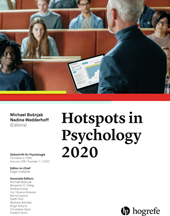Hotspots in Psychology – 2020 Edition
Abstract
Abstract. This editorial gives a brief introduction to the six articles included in the fourth “Hotspots in Psychology” of the Zeitschrift für Psychologie. The format is devoted to systematic reviews and meta-analyses in research-active fields that have generated a considerable number of primary studies. The common denominator is the research synthesis nature of the included articles, and not a specific psychological topic or theme that all articles have to address. Moreover, methodological advances in research synthesis methods relevant for any subfield of psychology are being addressed. Comprehensive supplemental material to the articles can be found in PsychArchives (https://www.psycharchives.org).
This fourth edition of the “Hotspots in Psychology” format is devoted to systematic reviews and meta-analyses in research-active (i.e., hotspot) fields that have generated a considerable number of primary studies. On par with the first three “Hotspots in Psychology” topical issues (Bošnjak & Erdfelder, 2018; Bošnjak & Gnambs, 2019; Erdfelder & Bošnjak, 2016), the common denominator is the research synthesis nature of the articles, and not a specific psychological topic or theme addressed by the articles. Moreover, these articles address methodological advances in research synthesis methods relevant for any subfield of psychology.
Substantive issues using meta-analysis are addressed by the following two papers.
Bartl, Blackshaw, Crossman, Allen, and Sandrini (2020) applied a network meta-analytic approach to analyze the effect of transcranial direct current stimulation (tDCS) on memory. Moreover, the focal point of the study was the analysis of different electrode locations. Although memory enhancement effects of tDCS have frequently been suggested in the empirical literature, the authors analyzed results from 23 experiments and concluded that there is not a conclusive modulation of verbal memory retrieval based on the electrode location.
In view of declining response rates in public opinion surveys, Burgard, Bošnjak, and Wedderhoff (2020) meta-analytically explored whether or not a similar trend also applies to online surveys in clinical psychology, specifically in studies on depression or general anxiety disorders. The authors estimated a mean response rate of approximately 43%, which is indeed declining over time. Additional moderators of the response rate were survey length and the type of invitation used. As expected by sensitivity reinforcement theory, no effect of incentives on survey participation in this specific group (scoring high on neuroticism) could be observed.
Methodological advances in the area of research synthesis methods are the focus of the following four papers.
De Jonge, Jak, and Kan (2020) analyzed the performance of a meta-analytic structural equation modeling (MASEM) approach when variables in primary studies have been artificially dichotomized. More specifically, they report on the results of two simulation studies comparing the impact of the inclusion of point-biserial versus biserial correlations in a full and partial mediation model. Overall, the biserial correlation performs better, and the authors recommend its use.
Assessing the quality of a systematic review is a crucial step for researchers as well as for practitioners and social and political decision makers. Though many instruments have been developed to assess quality-related aspects of systematic reviews, two critical appraisal instruments that are commonly applied are AMSTAR and its revised version AMSTAR2. To analyze differences between these two instruments, quality estimates for ten systematic reviews are assessed and compared in De Santis and Kaplan (2020). Although ratings on AMSTAR and AMSTAR2 are similar for most of the items, the quality of items on the revised version has substantially improved. Thus, compared to its previous version, AMSTAR2 may be seen as the preferred instrument for quality assessment.
Kossmeier, Tran, and Voracek (2020) have developed a graphical approach to depict study-level statistical power in the context of meta-analysis. Sunset (power-enhanced) funnel plots are recommended to visualize statistical power for assessing the inferential value of a set of studies. First application of the sunset funnel plot with two published meta-analyses from medicine and psychology are presented, and software to create this variation of the funnel plot is provided via a tailored R function.
Tsuji, Cristia, Frank, and Bergmann (2020) addressed two questions about unpublished data using MetaLab, a collection of community-augmented meta-analyses focused on developmental psychology. First, the authors assessed to what extent MetaLab datasets include gray literature, and by what search strategies they are unearthed. The authors find that an average of 11% of data points are from unpublished literature. Second, the authors analyzed the effect of including versus excluding unpublished literature on estimates of effect size and publication bias, and found this decision does not affect outcomes.
Overall, we very much hope that the contributions to this fourth “Hotspots in Psychology” issue stimulate further research and contribute to new and ongoing scientific discussions. We would like to point readers to the comprehensive sets of supplemental material facilitating reproduction and replication, which can be found in PsychArchvies (https://www.psycharchives.org).
References
(2020). Systematic review and network meta-analysis of anodal tDCS effects on verbal episodic memory: Modelling heterogeneity of stimulation locations. Zeitschrift für Psychologie, 228(1), 3–13. https://doi.org/10.1027/2151-2604/a000396
(2018). Hotspots in Psychology – 2018 Edition. Zeitschrift für Psychologie, 226(1), 1–2. https://doi.org/10.1027/2151-2604/a000323
(2020). Hotspots in Psychology – 2019 Edition. Zeitschrift für Psychologie, 227(1), 1–3. https://doi.org/10.1027/2151-2604/a000350
(2020). Response rates in online surveys with affective disorder participants: A meta-analysis of study design and time effects between 2008 and 2019. Zeitschrift für Psychologie, 228(1), 14–24. https://doi.org/10.1027/2151-2604/a000394
(2020). Dealing with artificially dichotomized variables in meta-analytic structural equation modeling. Zeitschrift für Psychologie, 228(1), 25–35. https://doi.org/10.1027/2151-2604/a000395
(2020). Assessing the quality of systematic reviews in healthcare using AMSTAR and AMSTAR2: A comparison of scores on both scales. Zeitschrift für Psychologie, 228(1), 36–42. https://doi.org/10.1027/2151-2604/a000397
(2016). Hotspots in Psychology: A new format for special issues of the Zeitschrift für Psychologie. Zeitschrift für Psychologie, 224(3), 141–144. https://doi.org/10.1027/2151-2604/a000249
(2020). Power-enhanced funnel plots for meta-analysis: The sunset funnel plot. Zeitschrift für Psychologie, 228(1), 43–49. https://doi.org/10.1027/2151-2604/a000392
(2020). Addressing publication bias in meta-analysis: Empirical findings from community-augmented meta-analyses of infant language development. Zeitschrift für Psychologie, 228(1), 50–61. https://doi.org/10.1027/2151/a000393



